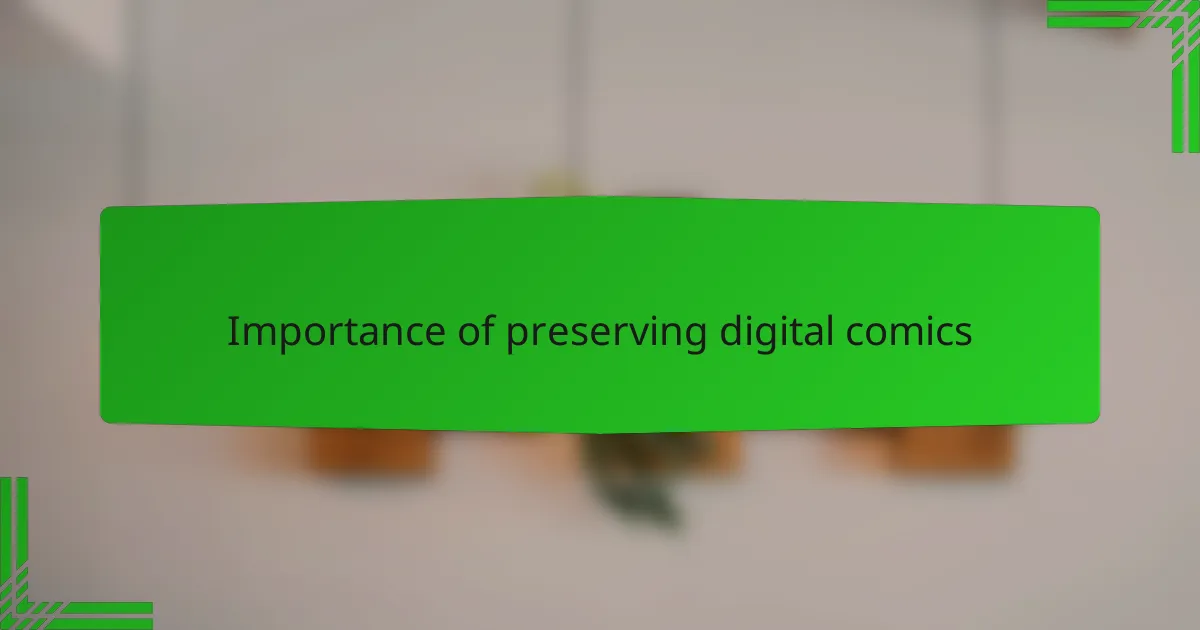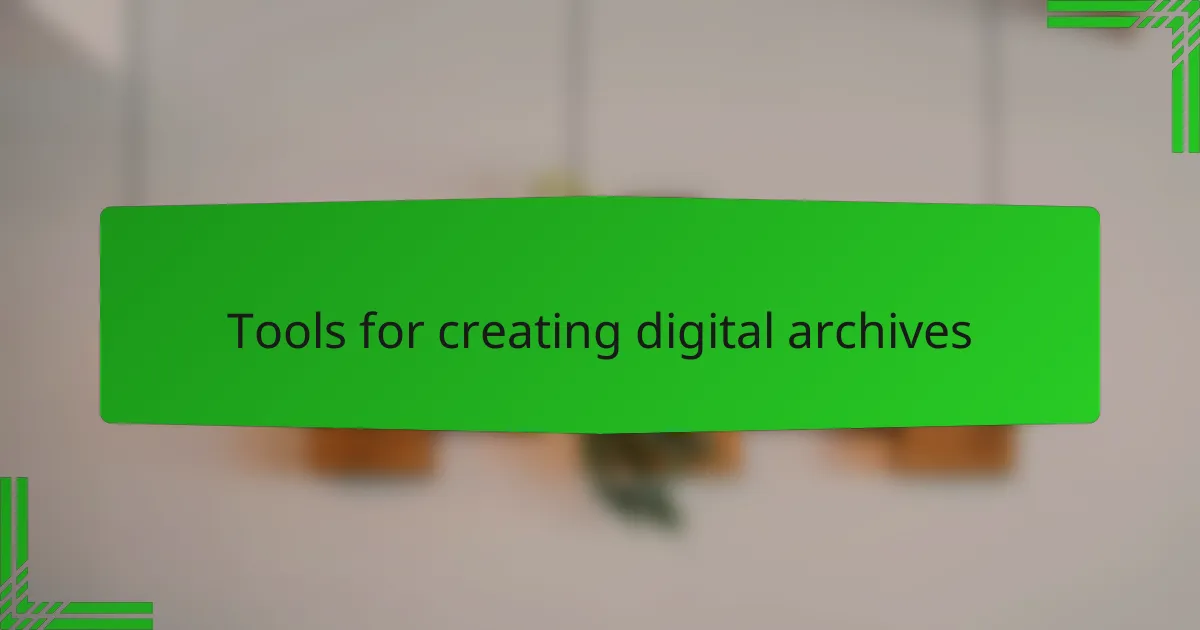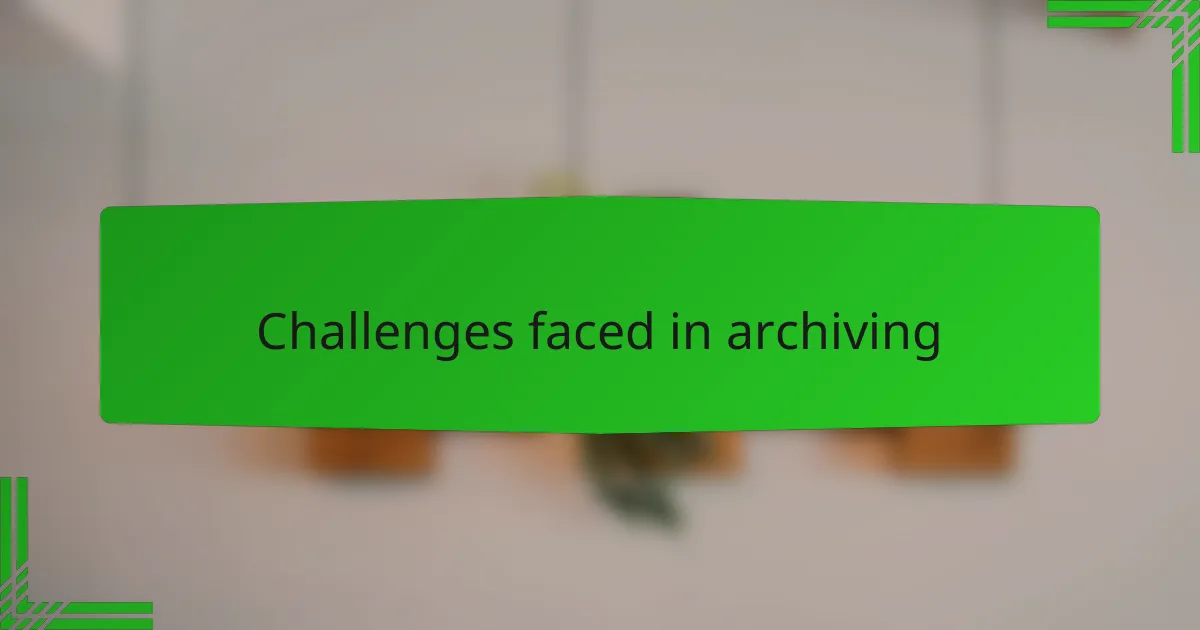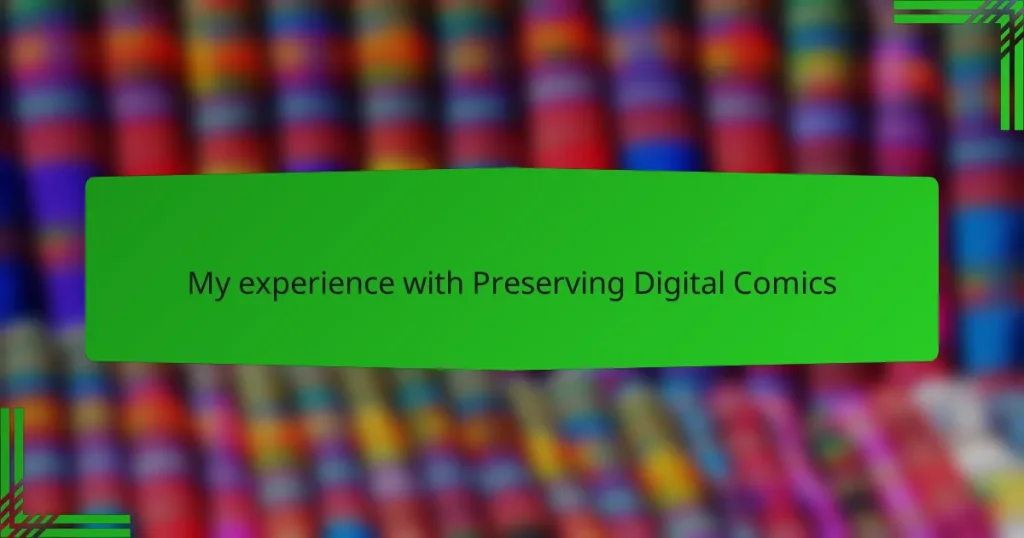Key takeaways
- Webcomics archives preserve digital comics, fostering emotional connections and cultural heritage for future generations.
- Effective preservation methods include cloud storage, external backups, and dedicated comic archiving websites, each with pros and cons.
- Utilizing tools like ComicRack, YACReader, and Calibre can enhance organization and accessibility of digital comic collections.
- Challenges in archiving include file format obsolescence, copyright navigation, and ensuring community engagement in preservation efforts.

Definition of webcomics archives
Webcomics archives are digital collections that serve to preserve and showcase webcomics, allowing readers to access and enjoy them long after their initial publication. From my experience, these archives play a crucial role in maintaining the history of webcomics, providing a platform where artists and their creations are honored and remembered. It’s not just about saving art; it’s about preserving the emotional connections that readers build with these stories over time.
When I first stumbled upon a webcomic archive, I was taken aback by the sheer volume of stories waiting to be discovered. It felt like opening a time capsule filled with creativity and passion. It’s important to note that these archives often support both well-known creators and emerging voices, bridging the gap between different generations of artists.
| Aspect | Webcomics |
|---|---|
| Accessibility | Available online for free or low cost |
| Preservation | Ensures long-term availability of content |
| Community Engagement | Encourages reader and creator interaction |

Importance of preserving digital comics
Preserving digital comics is crucial not only for the sake of nostalgia but also for cultural continuity. I often reflect on the joy they brought me growing up, flipping through digital pages on my screen. Every story holds a piece of my history; losing these comics means losing part of my childhood and a unique expression of creativity.
The comic landscape is constantly evolving, and without preservation efforts, many voices could be lost forever. We might not realize it now, but the diversity of storytelling that digital comics offer deserves to be safeguarded for future generations. Here are some reasons why preserving these works is essential:
- Cultural Heritage: Digital comics contribute to our cultural fabric and reflect societal values and issues.
- Diverse Voices: These comics often feature underrepresented perspectives that can be overlooked in mainstream media.
- Accessibility: With proper preservation, more people can access and enjoy the stories that resonate with them.
- Historical Record: They serve as a historical record of artistic and digital innovation in storytelling.
- Inspiration for Future Creators: Future artists and writers can draw inspiration from preserved works, fostering creativity and evolution in the medium.

Methods for archiving webcomics
When it comes to archiving webcomics, I’ve found a few methods that really stand out. One effective way is using cloud storage, like Google Drive or Dropbox. I appreciate the convenience of accessing my favorite comics from anywhere. However, I’ve also learned that simply relying on cloud storage isn’t enough. I’ve had my heart sink when a service suddenly changed its policies, leaving me worried about losing my archives.
Another method is creating local backups on an external hard drive. I remember the sense of security that washed over me after saving a large collection of indie webcomics I had grown fond of. That tangible backup gave me peace of mind, knowing I had a physical copy safe from the unpredictable nature of online platforms. Yet, I have to remain vigilant about hardware failures. It’s essential to refresh those backups every so often.
Lastly, there are dedicated comic archiving websites. I’ve uploaded my personal favorites to sites like Webtoon and Tapas; it’s like an online gallery for my cherished finds. The community aspect also provides a wonderful opportunity to connect with fellow comic enthusiasts and discover new stories.
| Method | Pros and Cons |
|---|---|
| Cloud Storage | Easy access; policies can change |
| External Hard Drive | Tangible security; risk of hardware failure |
| Comic Archiving Websites | Community engagement; limited control over content |

Tools for creating digital archives
When it comes to preserving digital comics, I’ve found that several tools can be invaluable in creating effective archives. One tool I love is ComicRack, which not only allows me to organize my comic library but also offers great features for tagging and managing metadata. Similarly, I’ve recently started using YACReader, and its user-friendly interface makes it a breeze to navigate through collections while keeping everything neatly categorized.
Each tool brings unique capabilities to the table, making it essential to choose one that fits your needs and workflow. For instance, I appreciate how Calibre lets me convert comic files into different formats, which has been particularly helpful when I’ve encountered compatibility issues. Remembering my initial struggles with file organization, having these tools made the whole process feel less overwhelming and more rewarding.
Here’s a quick comparison of some of the popular tools for creating digital comic archives:
| Tool | Features |
|---|---|
| ComicRack | Library management, tagging, and metadata options |
| YACReader | User-friendly interface, organization features |
| Calibre | File conversion, format compatibility |

My personal experience with preservation
As I delved into the process of preserving my digital comics, I was struck by how much these stories meant to me. I still remember the excitement of discovering a long-lost series that had shaped my teenage years. It made me realize that preserving these comics isn’t just about saving files; it’s about safeguarding memories and emotional experiences tied to those stories.
One time, while organizing my collection, I unearthed a comic I thought was gone forever. The rush of nostalgia washed over me, reminding me how these narratives often act as milestones in our lives. In those moments, I couldn’t help but wonder: how many others share similar attachments to the comics that defined their youth? It’s this deep connection that fuels my passion for preservation and encourages me to advocate for keeping these treasures accessible.
Throughout my journey, I’ve faced the reality of digital decay, which has motivated me to explore various strategies for preservation. I learned the lesson the hard way when a favorite website shut down, leaving me anxious about losing countless stories. This experience showed me the importance of having multiple backup methods, ensuring that the richness of our collective comic history remains intact for future readers and creators alike.

Challenges faced in archiving
Archiving digital comics presents a unique set of challenges that can often be overlooked. I remember the frustration I felt when I stumbled upon a beloved webcomic that had been taken down. It reminded me of how fleeting digital content can be and sparked my desire to preserve these treasures. Ensuring the right formats, finding reliable platforms, and even dealing with issues are ongoing hurdles that any archivist might encounter.
One major obstacle I’ve faced is maintaining data integrity through the years. As technology evolves, some formats become obsolete. I often find myself converting files just to keep up, which can feel like a never-ending race.
- File Format Issues: Some comics are saved in formats that aren’t widely supported anymore.
- Access and Copyright: Navigating copyright laws can complicate permission for archiving.
- Data Corruption: Files can become corrupt over time or through transfer between systems.
- Platform Changes: If a hosting service goes under, you risk losing access to entire archives.
- User Engagement: Sometimes, it’s hard to get the community involved in the preservation effort.
Each of these challenges underscores why a dedicated approach is essential. It’s not just archiving; it’s about preserving culture for future generations.




